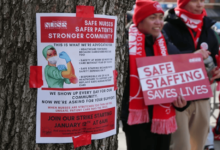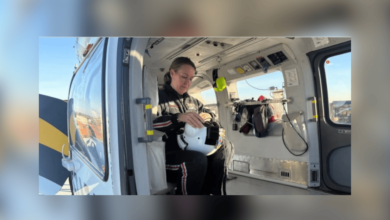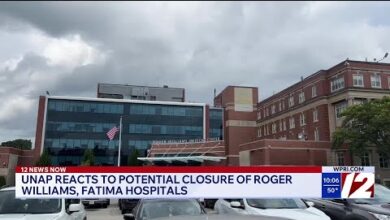Scotland FM questioned on newly qualified nurse jobs

The first minister of Scotland has been quizzed on how he will tackle the issue of newly registered nurses and midwives struggling to find a first job.
John Swinney fielded questions yesterday on the nursing workforce from two members of Scottish Parliament (MSPs) at the inaugural First Minister’s Questions (FMQs) session since the end of the parliamentary recess.
“Existing staff are burnt out and leaving, patient outcomes are worse and the government is in breach of its own legislation on safe staffing”
Jackie Baillie
During the FMQs, Mr Swinney hinted at the publication of a much-anticipated nursing workforce plan for Scotland and said the government was working with health boards to address ongoing recruitment difficulties.
Scottish Labour health and social care spokesperson Jackie Baillie asked Mr Swinney: “What action is the Scottish Government taking in response to reports that newly qualified nurses are unable to find employment in the NHS, despite there being over 3,300 whole-time equivalent unfilled nursing and midwifery vacancies?”
Ms Baillie said her office had been “inundated” with newly qualified midwives and paediatric nurses in particular, who remained unemployed despite vacancies across the health service.
She added: “At least £12m has been spent on their training, but cuts and vacancy freezes mean they do not have jobs.
“Existing staff are burnt out and leaving, patient outcomes are worse and the government is in breach of its own legislation on safe staffing.”
Mr Swinney responded: “The Scottish Government hugely values the work of nurses and midwives, we do continue to support health boards to ensure graduates can secure jobs in available roles within the NHS.
“We work with boards to ensure that we reinforce their commitment to maximising the opportunities for newly qualified nurses to find employment.”
He mentioned the growth in the number of registered nurses and midwives in the past year, and that midwife jobs have increased by 4.5% in that time.
Mr Swinney added: “I want to encourage health boards to ensure they have the resources and the staffing available to deliver services and the support that I talked about in the programme for government yesterday, because I recognise that consistency of support is essential in supporting women during pregnancy, and I want to ensure the best outcomes can be achieved by that approach.”
The issue of newly qualified nursing staff in Scotland being unable to find jobs was also raised outside of the Scottish Parliament earlier this year, through a petition demanding a decrease in the number of paediatric nursing student intakes to prevent an excess.
Meanwhile, in England, one final-year Bolton nursing student told Nursing Times that she and many of her peers were becoming increasingly anxious at their inability to find a job.
At FMQs on Thursday, the Scottish National Party’s Joe FitzPatrick, former public and women’s health minister, further pressed Mr Swinney for detail on how his government would address the issue in general, as well as asking for an update on work being done by the Nursing and Midwifery Taskforce.
“To be told there are no posts available is directly at odds with their personal experience”
Norman Provan
The first minister told parliament that a long-awaited work plan, which the Royal College of Nursing (RCN), among others, has called for, is now expected to be published later this year as part of the Nursing and Midwifery Taskforce’s “activity”.
“The taskforce is working collaboratively with stakeholders including RCN and Royal College of Midwives to develop actions which will help us to build a sustainable, attractive and respected nursing and midwifery workforce,” he added.
Following the FMQ session, RCN Scotland’s associate director Norman Provan said there had been a “failure” in the Scottish Government’s workforce planning processes, and accused it of being too focused on “short-term financial considerations”.
“Nursing students have been on placements within NHS and social care services,” he said.
“They have experienced overcrowding and the pressures on services and witnessed the significant gaps in the nursing workforce. To be told there are no posts available is directly at odds with their personal experience.”
He further called on the devolved government to better support newly-qualified nursing staff: “Otherwise, they risk these individuals moving away from Scotland or leaving the profession altogether.
“This issue must be addressed quickly as the experience of this year’s graduates will do nothing to attract people into the nursing profession.”







